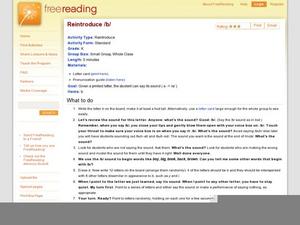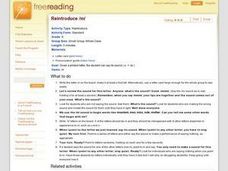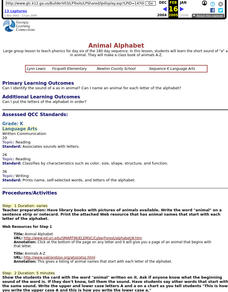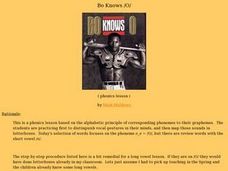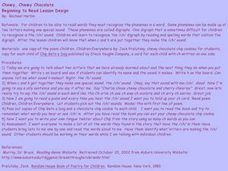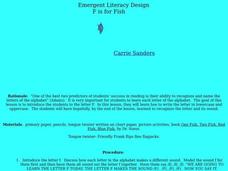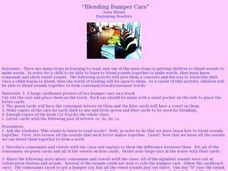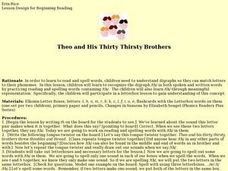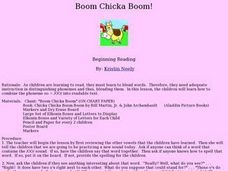Curated OER
Reintroduce /B/
Students study letters. In this letter identification lesson, students practice identifying and pronouncing the letter "b." They actively participate as a group in various drills the teacher leads them through. This lesson includes links...
Curated OER
Gulping Guppies
Learners recognize the phoneme /g/. Through listening and matching activities, students discriminate the phoneme /g/ from other letters and phonemes. They associate the phoneme /g/ with its letter representation and identify the phoneme...
Curated OER
Reintroduce /M/
Students study language. In this letter identification lesson, students practice pronouncing and recognizing the letter "m." They work as a group to actively particpate in various drills the teacher presents. This lesson includes links...
Curated OER
Reintroduce /D/
Students study letters. In this letter identification lesson plan, students practice recognizing and pronouncing the letter "d." They work as a group to actively participate in various drills the teacher leads them through. This lesson...
Curated OER
Animal Alphabet
Students make a class animal book using the letters of the alphabet. They use a website imbedded in this plan to get pages with animals that begin with any of the 26 letters.
Curated OER
Phonemic Awareness: Pronunciation of /ng/ Consonants
Students practice cononant sounds within reading passages. They articulate the /ng/ sounds and identify their placement in words. Working with a partner, they read a passage aloud and listen for correct pronunciation of sounds.
Curated OER
Thumped
Second graders identify the digraph /th/ in written and spoken language. After a brief discussion of the independent and combined sounds of the phonemes /t/ and /h/ students practice identifying initial and final placement of the new...
Curated OER
Bo Knows "O"
Pupils are introduced to the vowel-consonant-e patter that changes short vowel sounds into long vowel sounds. They distinguish between the short vowel o and long vowel o. Students practice reading and spelling words with the...
Curated OER
Meet Lee, the Sleepy Bee
First graders distinguish between the different ways to create the sound for long vowel e. They are introduced to the vowel patterns that comprise long vowel sounds. They practice reading and spelling a variety of words containing the...
Curated OER
Chewy, Chewy Chocolate
Students practice writing, sounding out, and identifying words with the /ch/ digraph. Students listen as the teacher says a tongue twister filled with /ch/ digraph words. They then listen to "Chip Gets a Dog" and raise their hand...
Curated OER
"OU" O U Hurt Me!
Students explore the digraph ou=/ow/ in written and spoken words. They practice writing words with the ou=/ow/ digraph. Students match phonemes in words they hear. Students read The Napping House and identify words with the ou=/ow/ digraph.
Curated OER
F is for Fish
Students study the letter "F, f" in order to recognize it, say its sound, and write it. They watch a partner's mouth as they make the "f" sound before repeating a tongue twister that contains many "f" sounds. Next, they practice writing...
Curated OER
Beat the Heat
First graders are introduced to the concept of vowel digraphs. They identify the digraph /ea/ in written and spoken language. After a brief discussion, 1st graders apply the rule for identifying and spelling words containing the /ea/...
Curated OER
Blending Bumper Cars
First graders practice blending words with the consonant-vowel-consonant pattern. Given a card with a decodable word part, 1st graders add an initial consonant sound and blend the sounds to read the new word. They practice reading a...
Curated OER
Bouncing and Dancing with B and D
Students explore the differences between the letters b and d. They practice seeing the letters and hearing the sounds with words and tongue twisters. They practice letter formation for both letters and listen to the book, The...
Curated OER
Picture Hunt: R Control O
Students use the r controlled o sound to sound out words and identify items and people in a picture. In this r controlled o lesson plan, students use the internet to complete their activity.
Curated OER
Spill the Beans
Students play an alphabet game with beans that asks them create simple short vowel words. They spill several marked beans onto a paper and separate those that have fallen face-up. They arrange the beans into words and read them aloud.
Curated OER
Chuga, Chuga, Choo, Choo
Young scholars identify the digraphs in written and spoken language. After a brief discussion on the combinations of letters that comprise digraphs, students practice identifying initial and final placement of the digraph /ch/ in words...
Curated OER
Sneeze Cheese
Students study the /ch/ digraph by thinking of the sound that is made when someone sneezes. They listen to a tongue twister while identifying how many times they hear the /ch/ sounds and make words using the Elkonin boxes and letters....
Curated OER
Thump Your Thinker
First graders discuss how t and h together make one sound and then make the sound while examining the mouth movement associated with it. They listen for the sounds in sentences that are read to them before making words with the Elkonin...
Curated OER
Theo and His Thirty Thirsty Brothers
Students recognize the digraph /th/ in both spoken and written words. They read and spell words containing /th/ digraph. They read "Changes in Seasons" by Eizabeth Sengel and make a list of the words containing /th/ digraph.
Curated OER
Hungry, Hungry Harry
Students study the /h/ sound as the sound you hear when you breath into your hand. They write the letter before drawing a picture of something that begins with the letter /h/. Next, they listen to Joanne Partis', "Hungry Harry," raising...
Curated OER
Boom Chicka Boom
Students recognize how vowel patterns change a short vowel sound into a long vowel sound. With an emphasis on the /oo/ that makes the long U sound, students identify the phoneme and letter combination through listening and matching...
Curated OER
Shaggy Sheba Shakes!
Students study the /sh/ digraph in order to determine that when the letters are together in a word they make one sound. They use letter boxes, letter manipulatives with the sh taped together, and poem, "My Shaggy Dog." Using the...
